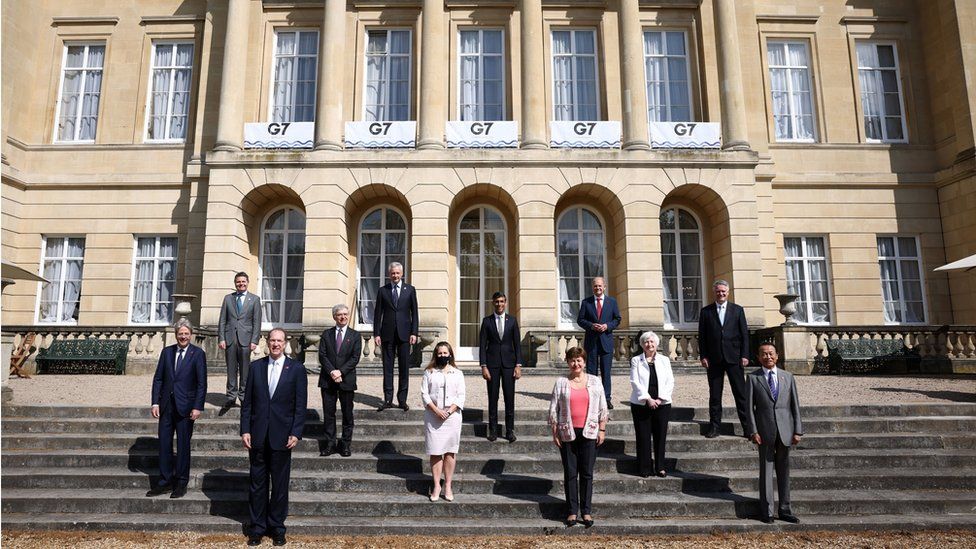
A landmark deal struck by rich nations to make multinational companies pay more tax has been criticised by campaigners for not going far enough.
G7 account priests meeting in London consented to fight charge evasion by making enormous organizations pay more duty in the nations where they work together. Tech monsters firms prone to be affected have invited the new principles. Yet, the cause Oxfam says a concurred 15% worldwide least corporate expense rate is “awfully low” to make a difference.The bargain declared on Saturday between the G7 gathering of well off countries – US, the UK, France, Germany, Canada, Italy and Japan, in addition to the EU – could see billions of dollars stream to governments to take care of obligations brought about during the Covid emergency. UK Chancellor of the Exchequer Rishi Sunak, who facilitated the culmination, said the understanding would make “a more attractive expense framework fit for the 21st Century”.The bargain concurred on a fundamental level that global organizations pay a base duty pace of in any event 15% in every country they work. In any case, help good cause said the concurred rate is excessively low and would not prevent assessment sanctuaries from working. “It’s ludicrous for the G7 to guarantee it is ‘upgrading’ a wrecked worldwide expense framework by setting up a worldwide least corporate assessment rate that is like the delicate rates charged by duty safe houses like Ireland, Switzerland and Singapore,” said Oxfam’s leader chief Gabriela Bucher. “They are setting the bar so low that organizations can simply venture over it.” She said the arrangement was ridiculous as it would profit G7 states, where a considerable lot of the enormous organizations are settled, to the detriment of more unfortunate countries. Alex Cobham, CEO of the Tax Justice Network, considered the arrangement a “defining moment” yet said it remained “very unreasonable”. “We have one stage of the way today – the possibility of a base assessment rate – what we need is to ensure that the advantages of that, the incomes, are appropriated reasonably all throughout the planet,” he told the BBC. The arrangement will be considered at a gathering one month from now of the G20, including China and India.Governments have since a long time ago wrestled with the test of burdening worldwide organizations working across numerous nations. That test has developed with the blast in gigantic tech partnerships like Amazon and Facebook. Right now organizations can set up nearby offices in nations that have moderately low corporate duty rates and proclaim benefits there. That implies they just compensation the nearby pace of expense, regardless of whether the benefits predominantly come from deals made somewhere else. This is legitimate and normally done. The arrangement means to prevent this from occurring twoly. Right off the bat the G7 will mean to make organizations pay more duty in the nations where they are selling their items or administrations, as opposed to any place they wind up pronouncing their benefits. Also, they need a worldwide least expense rate to keep away from nations undermining each other with low duty rates. The standards on making multinationals pay charges where they work – known as “column one” of the arrangement – would apply to worldwide organizations with in any event a 10% overall revenue. A fifth of any benefit over that would be redistributed and burdened in the nations where they work, as indicated by the G7 report. US Treasury Secretary Janet Yellen said there was an arrangement that public computerized administrations duties, for example, those collected by the UK and EU nations would be rejected and supplanted by the new understanding. Such expenses are viewed by the US as unreasonably focusing on American innovation goliaths. US challenges ‘uncalled for’ tech charges in the UK and EU “The circumstance still needs to be worked out precisely yet there is expansive understanding that these two things go inseparably,” the depository secretary said. Low-charge Ireland – which dangers missing out from the arrangement – says the worries of more modest nations should be heeded.Tech monsters gave it a perky evaluation. “We need the worldwide duty change interaction to succeed and perceive this could mean Facebook covering more assessment, and in better places,” said Facebook’s Nick Clegg. A representative for Amazon said the understanding is a “progression forward” in bringing “security to the global expense framework”. A representative for Google said: “We unequivocally support the work being done to refresh worldwide assessment rules. We trust nations keep on cooperating to guarantee a decent and tough arrangement will be settled soon.”





































































































































































































































































































































































































































































































































































































































































































































RSS